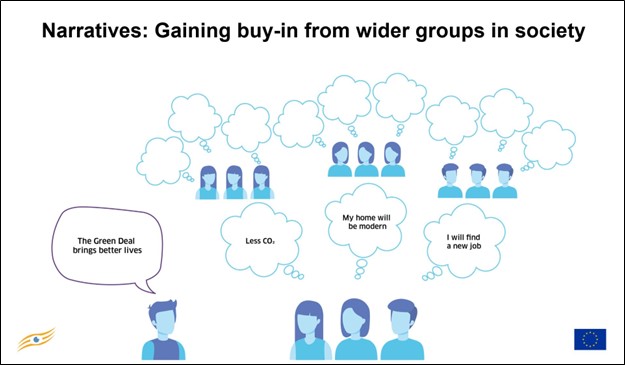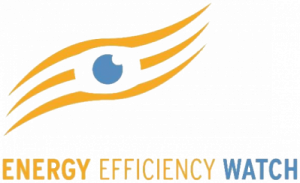About Energy Efficiency
With the European Green Deal, the Fit for 55 agenda and RePowerEU, energy efficiency has again been recognised as an important element of EU’s political agenda. Policy makers are progressively understanding energy efficiency as a key enabler for a low-cost and rapid decarbonisation of the energy system, and for reaching climate and energy targets in 2030 and 2050. It is also one of the remedies of the energy crisis.
Our mission and approach
Energy Efficiency Watch 5 (EEW5) is a 3-year project under the European Union LIFE programme (within the Clean Energy Transition section – CET).

EEW5 supports the public sector at all governance levels in an ambitious and high-quality implementation of the European Green Deal and its energy efficiency (EE) policies (mainly the Energy Efficiency Directive EED) by developing meaningful narratives for different national and regional contexts and comprehensive policy information.
The Green Deal raised the levels of ambition for the energy transition and a comprehensive revision of EU energy policies has been completed. This increased ambition level and the overarching target of climate neutrality require new approaches in policy making and support. Also, in order to achieve the speed of policy making that is needed, policy makers on EU, national, regional and local levels need new tools and up-to-date information to adapt these ambition levels into their specific contexts.
The overarching objective of EEW5 is to support enabling narratives for the European Green Deal, putting more emphasis on a) increased competitiveness and b) a better quality of life and thus creating the necessary buy-in of larger groups of society across all EU Member States.
Objective 1
Discuss and broadly disseminate the new energy efficiency policies under the Green Deal with policy makers and the stakeholder community, through the EEW5 policy dialogue platform:
Events at European and national parliaments
Events for the stakeholder community (businesses, regions, cities, energy agencies, NGOs) at regional and municipal levels in all EU MS
Dissemination of findings and results via website, social media, report and a brochure
Objective 2
Create a strong link between EU Green Deal related energy efficiency policies (revised EED and other relevant directives and instruments) and supportive narratives, through:
Collecting input from various stakeholder groups on successful (or – for getting a full understanding – also counterproductive) narratives, which can support EU policy implementation in the respective countries and sector contexts.
- MEPs and Members of National Parliaments
- Public administrations on all levels, regional and local energy agencies
- Scientific community
- Business stakeholders
Objective 3
Develop, test and roll-out new narratives and provide policy recommendations, through:
Building of new narratives creating sufficient buy-in for the Green Deal among large groups of the population in all EU MS and the roll-out of new enabling and supportive narratives supporting the EU Green Deal to key stakeholders.
- Presenting ten narrative cases, by which the interaction between the implementation of European Green Deal related policies and supportive narratives is shown in different country and sector contexts
- Testing these narrative cases with a broad variety of stakeholders and, based on the discussions, further refining them
- Disseminating the finalized ten narrative cases as a source for mutual learning at relevant conferences, events and stakeholder discussions in a broad range of member states and on EU level
- Providing policy recommendations to policy makers and stakeholder communities, in particular on how to support policy implementation by successful narratives and make use of them also beyond the timeline of the project for facilitating a meaningful European Green Deal

All project’s results will be published under Publications.
Benefits
EEW5 supports full engagement of the public sector at all governance levels, in order to deliver on the EU Green Deal targets, by the development of narratives at national, regional and local levels. These narratives form an essential building block towards higher levels of implementation. They combine the aim of decarbonization Europe’s economy with other key benefits of energy efficiency which increase broad acceptance in society for other reasons than climate protection.
The project will address all sectors of energy efficiency technologies, such as buildings, industry or services, in order to represent the full range of benefits and contributions of energy efficiency. It will in this context strongly focus on communication and knowledge sharing between policy makers and market participants (the business stakeholders’ community).
The impact of the project will be two-fold:
- Activation of the full savings potential of policies. EEW5 will directly improve the performance of the policies and policy packages on which the Green Deal is based.
- More ambitious and effective implementation of EU policies through increased understanding in public administrations and of policy makers.
Our stakeholders
The project foresees an involvement of all governance levels.
The national and EU levels are reached via regular Parliamentary Workshops, Interparliamentary Meetings, and via participation of representatives of the administration in the survey.
The regional and municipal levels are reached through activities such as dedicated workshops, webinars and local events of the network partners Borg&Co (eceee) and FEDARENE.
EEW5 will reach out as well to the representatives of the business community, to national experts from energy agencies through the network partner ESV, and to civil society.
Previous Energy Efficiency Watch projects
Energy Efficiency Watch 5 is based on the findings of the preceding projects EEW4, EEW3, EEW2 and EEW1. EEW 1-3 analysed the mechanisms of how to further encourage mutual learning on policy instruments among the EU MS, showing that comprehensive policy packages are more effective than single, non-combined measures, illustrating good practice and providing recommendations on how to further improve the process of policy development.
EEW4 laid the ground for the narratives research and development, which is via EEW5 now adapted to the EU Green Deal as the new EU growth principle.
